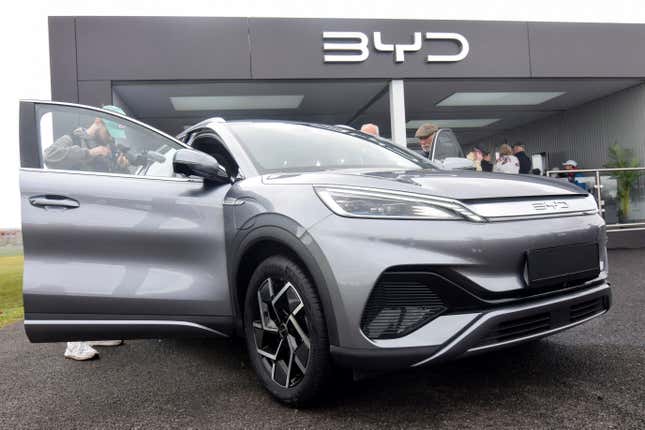
China’s auto industry is on the up and up. Its EV exports are set to double this year, and the country could well snatch the crown from Japan as the world’s top car exporter.
The newly released Fortune Global 500 list, which ranks companies worldwide by revenue, also reflects China’s rise as a global automotive powerhouse. One useful indicator is which companies have climbed the most in ranks relative to the previous year.
BYD’s soaring revenues are propelling it up Fortune’s Global 500 ranking
Chinese EV maker BYD, which was the top seller worldwide of electric and plug-in hybrid vehicles last year, shot up 224 ranks compared to last year, when it first made the Global 500 list. It is currently ranked 212th. That improvement is only second to US information technology services provider TD Synnex, whose ranking rose 236 spots.
BYD’s vertical integration strategy is propelling the automaker far ahead of its rivals in terms of production capacity and market share.
The company has built a full supply chain spanning lithium mines, lithium processing, battery production, and an in-house computer chip unit. It’s even building out a fully-fledged car shipping operation to ensure it can transport its finished products to export markets.
The strategy is paying off: in July, BYD broke its monthly EV sales record for a third consecutive month.
CATL made the global top 500 list for the first time
Another major player in the Chinese EV industry is CATL. The battery giant made it on Fortune’s Global 500 list for the first time this year, reflecting the surging demand in China and worldwide for its products. CATL is currently ranked 292nd.
CATL’s induction into the top 500 ranking is in part thanks to consecutive quarters of soaring revenues and profits. Last week, CATL reported a 56% increase in revenue to 100 billion yuan ($13.9 billion) and a 63% jump in profits.
Meanwhile, some of the companies that saw the largest drops in rankings reflect the ailing state of China’s property market. Cement maker Anhui Conch and steelmaker Beijing Jianlong Heavy Industry sank 111 and 102 places, respectively, to 464th and 465th place.
Foreign automakers are paying “tuition fees” to their Chinese rivals
It’s not just battery and EV sales that mark the Chinese EV industry’s dominance. Foreign automakers are now turning to Chinese EV technology in a bid to boost their own competitiveness.
Last week, German automaker Volkswagen invested $700 million for a 5% stake in its Chinese rival Xpeng, and the two will jointly develop EVs using the latter’s platform technoloy. An EV platform is the base layer structure of the car, and can save costs and time by being used across different models.
The news follows Volkswagen subsidiary Audi’s recent announcement that it’s working with Chinese state-owned automaker SAIC to develop EVs. Audi is also reportedly looking to buy SAIC’s EV platform.
As one Chinese media outlet put it (link in Chinese), referring to the Volkswagen-Xpeng tie-up: “Volkswagen just paid Xpeng [$700 million] in tuition fees.”
US carmaker Ford is arguably doing the same with its battery factory partnership with CATL. Other foreign auto companies will likely follow suit.